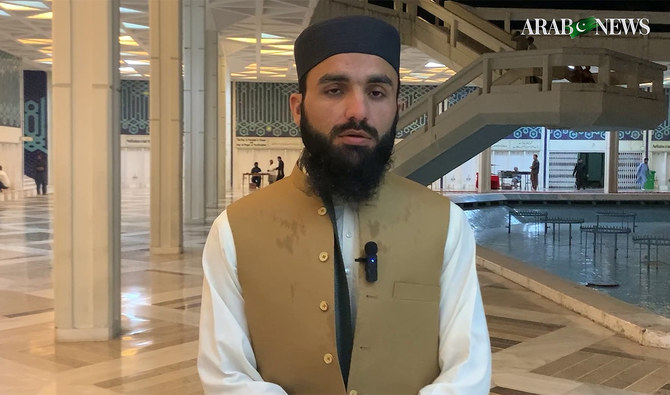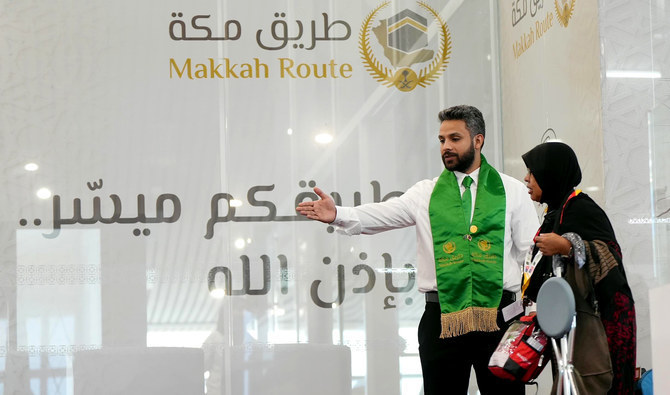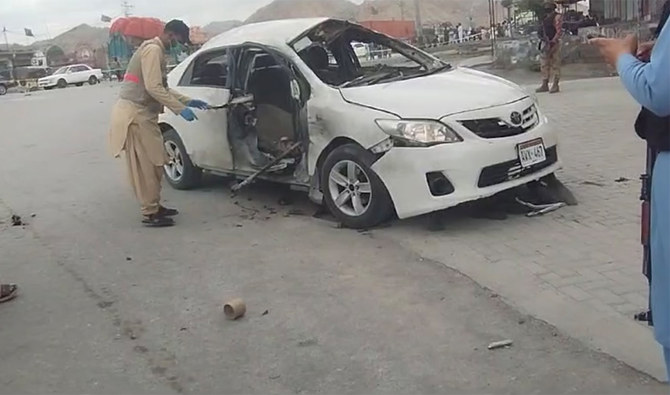ISLAMABAD: As twilight descended over Islamabad’s skyline, Muhammad Bilal Orakzai stood up in front of rows of believers inside the huge, packed hall of the majestic Faisal Mosque in Pakistan’s capital of Islamabad, ready to lead Taraweeh night prayers.
It is a huge honor that only a few are bestowed with each year, and it doesn’t come easy.
Orakzai, 22, is one of 14 reciters of the holy Qur’an, or qaris, chosen from across Pakistan, Azad Kashmir and Gilgit-Baltistan by the country’s religious affairs ministry to lead Taraweeh, special Ramadan night prayers, at Faisal Mosque.
The 14 reciters were chosen to participate in the religious ministry’s annual “Mehfil-e-Shabeena” event at Faisal Mosque after a rigorous three-month-long competition. Now they nightly recite long portions of the holy Qur’an there and lead prayers.
“There is no doubt in the greatness of Faisal Mosque, and to recite here, we prepare hard the whole year round,” Orakzai told Arab News in an interview this week. “And when we get the fruit of that labor, it feels very good.
“When we recite taraweeh here, people line up to shake hands with us. What are we? We are just humans, and humans are weak, but because of this Qur’an recitation [at Faisal Mosque], God has blessed us so much.”
Faisal Mosque, named after Saudi Arabia’s King Faisal bin Abdul Aziz who gave a $120 million grant for its construction, is one of Pakistan’s most prominent landmarks, built over a sprawling 54,000 square feet with a capacity to accommodate over 250,000 people at a time.
It is the largest mosque in Pakistan and the fifth largest in the world, breaking from traditional Islamic structures like domes and instead built along clean modern lines resembling the tents used by nomadic Arab Bedouin tribes, with sloping roofs and a unique angular body.
To lead the Taraweeh at Faisal Mosque was an “honor and a dream” for any Pakistani qari, Orakzai said.
“I would say, who wouldn’t want to recite the Qur’an at the Faisal Mosque?” he added. “I feel extremely proud.”
He described the mosque itself as “marvelous”:
“Indeed, it is one of the most marvelous mosques in the entire Muslim world and has its own value in the hearts of Muslims.”
“ULTIMATE PRIZE”
The journey to Faisal Mosque has been a long one for Orakzai, who began practicing Qur’an recitations when he was just a few years old, encouraged by his teachers and parents to take part in competitions. He memorized the entire Qur’an, which has 6,236 verses, at the age of nine.
“I have been interested in these competitions since childhood,” Orakzai, who completed intermediate studies in science from a college in Islamabad, said.
“[My teachers] used to take me, and Alhamdulillah, I would win. 2008, 2009, 2010, in these three years consecutively I topped in Qirat [Qur’an recitation] competitions across Pakistan … Even now two months back, I secured the first position in the whole of Punjab province and qualified for the national final, which will take place after Ramadan.”
Orakzai first participated in the competition to recite the Qur’an at the Faisal Mosque in 2018 and was selected on his maiden attempt.
“It is for the fifth time that I have been leading Taraweeh prayers at the Faisal Mosque and from the [religious] ministry, it is my third time to lead Taraweeh prayer here,” he added.
Winning the competition once, let alone five times, is no easy task. To impress the judges, a qari must be equipped with multiple skills.
“You must master all elements, including your accent and delivery, as the judges of the competition are PhD doctors who meticulously evaluate every aspect to determine whether you pass or fail each round,” Orakzai explained.
Today, other than focusing on his recitation skills, he also teaches at a religious school in Rawalpindi.
“I am running a religious school in Rawalpindi where I got this blessing of teaching the Qur’an to others,” Orakzai said. “I want to remain attached to the Qur’an till my last breath.”
Going forward, Orakzai has his eyes on the ultimate prize:
“I pray to Allah to bless me, that I can go abroad and have the honor [of reciting Qur’an] in Haram Sharif [in Makkah].”















